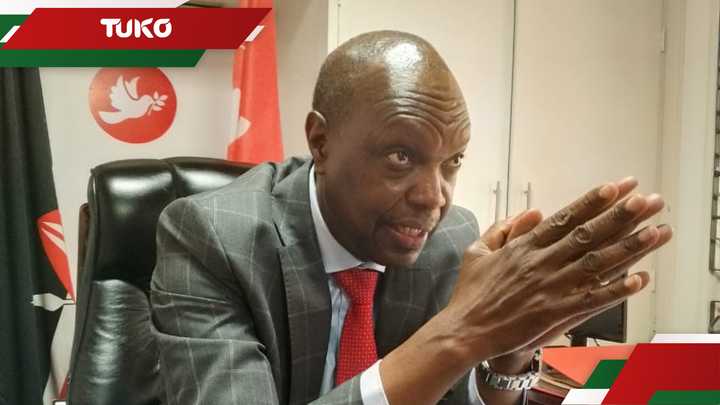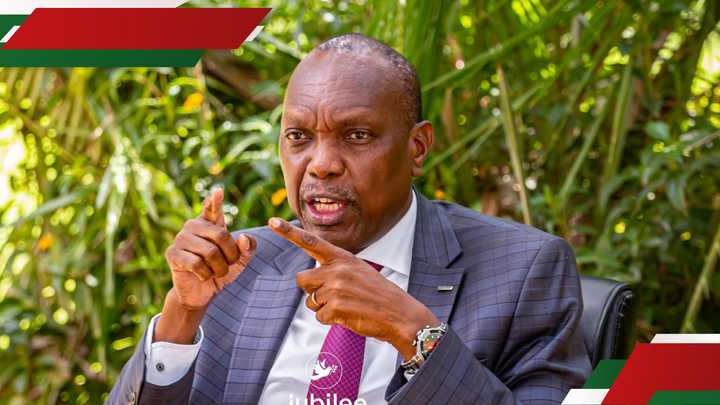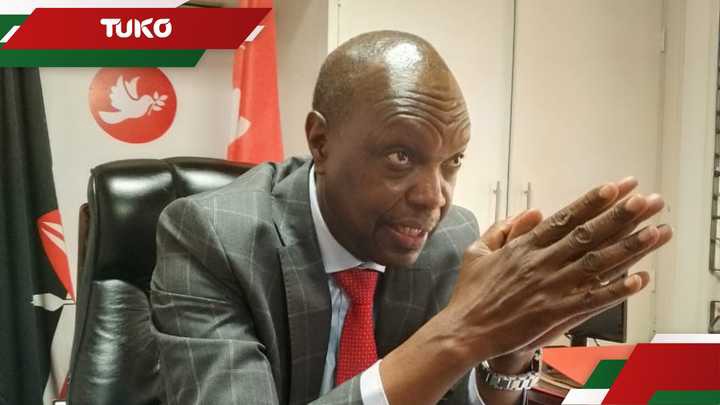- Jubilee’s Jeremiah Kioni urged Raila Odinga to urgently cut ties with President William Ruto, warning that continued alliance could ruin his legacy
- Kioni said Raila had effectively joined Kenya Kwanza’s ranks, accusing him of betraying the opposition and abandoning their core principles
- He criticised Raila’s silence during the IEBC reconstitution process, calling it complicity in Ruto’s unilateral decisions that undermine electoral trust
- Kioni stressed that opposition input in selecting IEBC commissioners is vital to preserving public confidence in future elections
CHECK OUT: You’re One Course Away from Transforming Your Life. Learn Copywriting and Turn Your Passion into Profit
Didacus Malowa, a journalist at TUKO.co.ke, brings over three years of experience covering politics and current affairs in Kenya.
Nairobi – Jubilee party secretary-general Jeremiah Kioni has urged ODM leader Raila Odinga to urgently part ways with President William Ruto.

Kioni warned that continued association with the Kenya Kwanza administration could irreparably damage Raila’s political credibility ahead of the 2027 General Election.
Speaking exclusively to TUKO.co.ke, Kioni pointed to ongoing political realignment in the country, urging the veteran politician to make a change.
Search option is now available at TUKO! Feel free to search the content on topics/people you enjoy reading about in the top right corner 😉
Kioni stated that the former premier was only left with the decision to exit Ruto’s broad-based working agreement.
The former MP gave the imagery of the dissatisfaction among Kenyans, claiming that Ruto’s shoe incident in Migori was another proof of the discontent.
“Raila just needs to flee, flee from this so-called broad-based arrangement; flee quickly, let him leave! He’ll leave without his shoes, did you see shoes flying through the air? People are furious. Right now, the best political strategy for Raila is to exit, with a capital E,” he explained.
How did Raila betray opposition
Kioni further observed developments in the ongoing reconstitution of the Independent Electoral and Boundaries Commission (IEBC) as a clear sign that Raila had abandoned the opposition cause.
He accused the former prime minister of betraying Azimio la Umoja by aligning himself with Ruto’s government, undermining the coalition’s hard-fought agreements in the bipartisan talks.
Kioni was especially critical of Raila’s role in the aftermath of Ruto receiving the IEBC shortlist, arguing that the move should have triggered a mandatory consultation between Kenya Kwanza and Azimio, a provision explicitly outlined in the National Dialogue Committee (NADCO) report and the enabling statute passed by Parliament.
According to Kioni, that consultation never happened, and Raila’s silence since getting in bed with Kenya Kwanza signals complicity.
In his view, Raila had effectively become part of the Kenya Kwanza decision-making apparatus, making it difficult for him to convincingly distance himself from the government’s actions.
“Raila moved and became part of Kenya Kwanza. For all practical purposes, it is very difficult for him to say that he is not part and parcel of what they do on a daily basis,” Kioni maintained.
Kioni pointed out that any claims of consultation between Ruto and Raila are merely a cover for the president’s unilateral moves that threaten the transparency of Kenya’s electoral future.
“For Ruto, to pretend that he has consulted Raila and now, they can release the document he’s already introducing suspicion. He is allowing suspicion in this whole process, that this is a one-man show it and it should never have been that way,” he stated.
Why is consultation on IEBC reconstitution critical
Kioni underscored the importance of opposition involvement in the IEBC selection process, noting that the country’s political history had shown the dangers of leaving such decisions solely in the hands of those in power.

The IEBC, which plays a critical role in managing Kenya’s electoral processes, has long been a lightning rod in Kenyan politics.
Previous disputed elections have often centred around questions of neutrality and transparency in how commissioners are selected.
He explained why allowing other political factions to help select electoral referees is essential to maintaining public trust in the outcomes of elections.
“Our history tells us differently that allowing other parties to participate in appointing a referee helps us in having respect with the outcome of the game at the end of it all. So this is not a good thing, and it’s not too late, and there is a need for us to engage in that consultation?” Kioni posed.
What is the symbolism behind Ruto’s shoe incident
Earlier, Kioni commented on the recent incident where a shoe was thrown at Ruto during a rally in Migori county.
Kioni interpreted the act as a clear sign of growing public frustration with the current administration.
He stated that the incident reflected not personal animosity but widespread dissatisfaction with government actions and concerns about future governance.
Source: TUKO.co.ke
